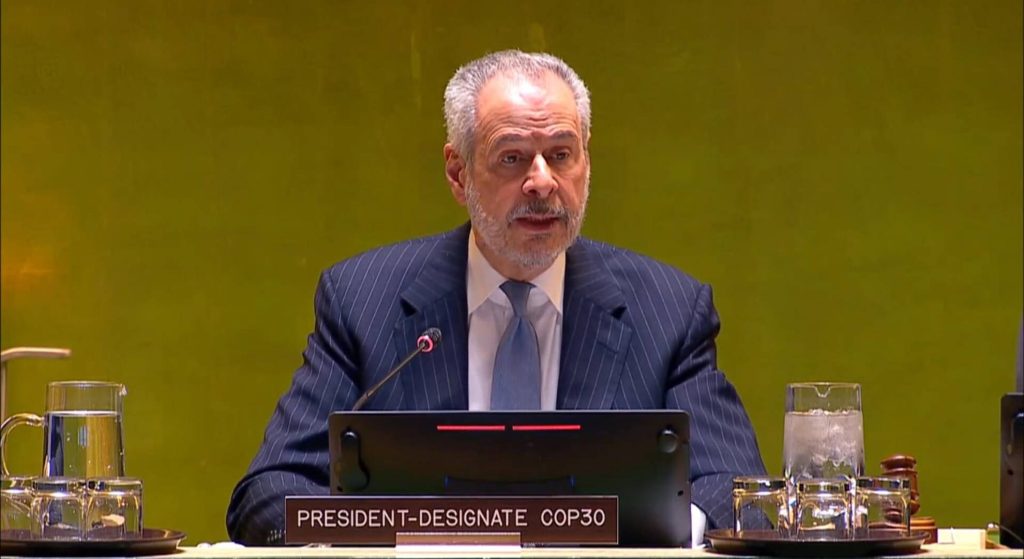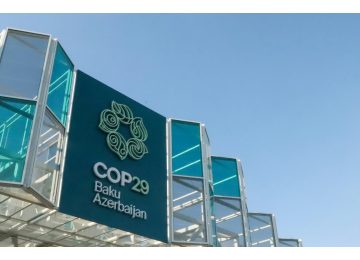By Gayatri Ramanathan
President of the 30th Conference of Parties to UNFCCC, COP30, André Correa do Lago, presented a letter outlining Brazil’s vision for the summit, to be held at Belém, at the mouth of the Amazon River.
The document outlines the path forward, urging countries to choose resilience and decisive action over catastrophe, cynicism, and denial. “As the nation of football, Brazil believes we can win by. This means fighting back to turn the game around when defeat seems almost certain,” it states.
The 11-page document is addressed to leaders and stakeholders involved in negotiations under the United Nations Framework Convention on Climate Change (UNFCCC).
In a separate briefing to journalists, Correa do Lago said it was essential to “do our best to link the abstraction of these negotiations and the decisions of the COP to real life.” He said there was a perception that these talks, which every year convene negotiators from nearly 200 nations for almost two weeks of intense haggling, did not deliver what was needed.
The timing is not favorable for big new commitments on climate change, with Europe shifting money towards defense and the United States withdrawing from the Paris Agreement entirely. “The international context is very difficult for negotiations,” said Correa do Lago. “Let’s see how we can accelerate what we have already decided.”
He also spoke of the limits of the UN climate process and its landmark accord, the Paris Agreement, in implementing decisions and thinking more holistically about how to tackle global warming.
According to the Brazilian negotiator, while the Paris Agreement is functional, negotiations must be translated into concrete actions and effective results. “Lack of ambition will be judged as lack of leadership, as there will be no global leadership in the 21st century that is not defined by climate leadership,” the letter says.
For the Brazilian negotiators, COP30 will serve as the pivotal point, gaining momentum from each nation’s actions to address the global challenge. “The legitimate forum for negotiations is the Paris Agreement and the Climate Convention. This is why there is a clear distinction between what is to be negotiated and its implementation, which relies on other bodies,” explains Corrêa do Lago.
Among the key issues still pending in the negotiations, the letter highlights the implementation of the Global Stocktake (GST), a transparency mechanism outlined in the Paris Agreement. The first version of the GST was presented during COP28 in Dubai, United Arab Emirates. According to the document, countries must make progress in presenting their nationally determined contributions (NDCs) and biennial transparency reports.
The letter notes that negotiations on the Just Transition Work Program (JTWP) still need to be concluded. The document addresses mitigation, adaptation, financing, technology, and capacity building from the perspective of the most vulnerable countries. It also emphasizes the integration of cross-cutting climate change agendas as a key theme for COP30, highlighting the importance of robust public participation and expanding the role and contributions of indigenous peoples and local communities.
“The more ubiquitous our fight against climate change becomes, the more we need to incorporate synergies between climate, biodiversity, desertification, and our Sustainable Development Goals (SDGs),” the letter states.
In this regard, the COP30 presidency has committed to conducting a Global Ethical Stocktake (GES) to engage a geographically diverse group of thinkers, scientists, politicians, religious leaders, artists, philosophers, and representatives of indigenous and traditional communities.
Among other initiatives and discussions, the COP30 presidency highlighted the continuation of efforts to develop the $1.3 trillion Road Map from Baku to Belém. Initiated at COP29 in Baku, Azerbaijan, this initiative aims to enhance financing mechanisms to ensure climate action, particularly in the least developed countries.
“Climate shocks may not come slowly—they might emerge abruptly, in irreversible shifts,” the letter warns. It concludes by stating that the COP30 presidency will serve as the driving force behind a global effort to guide the world toward a future led by nations committed to renewal, regeneration, and global cooperation.
***The author is a Strategic Advisor, Write Canvas












